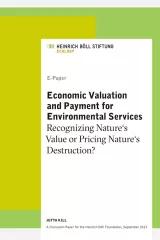Comment on Jutta Kill’s “Economic Valuation and Payment for Environmental Services”
Jutta Kill provides an excellent summary of why market-based or market-like valuation of ‘nature’ does not work as a tool for reducing climate change and biodiversity loss but rather is likely to worsen both trends. As I read it, she is criticizing the illusion that quantification of the elements and activities of ecosystems can guide policy, and most importantly, she is debunking the notion that pollution and destruction in one place can be balanced out, or ‘offset’, in a different place.
Kill’s analysis leaves some room for the concept of ‘ecosystem services’ as a heuristic device, a metaphor that draws attention to human dependence on living ecosystems, but only in a very general sense. But, she argues, ‘ecosystem services’ must not be treated as sets of scientific data to be fed into formulae that help us avoid tough political decisions by calculating ‘optimal’ policy choices for us.
The paper, if I read it as she intended, also does not rule out Compensation for Ecosystem Services: policies that would reward land users for their efforts in conserving their surroundings or that would reimburse their sacrifices when democratic processes yield decisions that reduce their access to resources.
However, attempts to quantify ecosystems services, which require disaggregation of the intricately and irreducibly interconnected ‘functions’ of ecosystems, result in bundles of parts that comprise far less than the whole. This, Kill contends, paves the way for policies that prioritize those ‘functions’ that will be saved because someone wants to and is economically able to pay for their (hoped-for) preservation. In turn, this enables the substitution of one ecosystem for a different one that supposedly has that same, economically-valued function -- regardless of whatever else is lost.
As the paper points out, such practices typically and increasingly occur when ‘ecosystem services’ are priced in monetary terms and then made subject to market-efficiency criteria for determining their fates, or when they are traded in actual markets, enabling polluting or destroying enterprises to buy their way out of compliance with conservation or climate regulations.
Some proponents of ‘green economy’ (ecological modernization) might respond to Kill’s paper with the demurral that quantification and even monetary pricing need not entail ‘selling nature’. Perhaps, in theory. But the real-world application of monetary valuation of ecosystems is gaining momentum and galloping in precisely the direction that Kill warns against. We see this, for example, in the energetic efforts of the International Emissions Trading Association to establish a global emissions-trading system for fungible pollution and carbon-sink ‘services’ worldwide, and in the announcements of new cap-and-trade programs, offsetting included, in jurisdictions around the world.
We also see it in the REDD+ provisions in the Paris COP 21 pledges of at least 29 developing countries, provisions that allow them to promise lower targets for slowing their own emissions growth, and in phrases such as ‘climate neutrality’ and ‘internationally transferred mitigation outcomes’ which remain in the draft negotiating text as of the end of the first week. (Of course, REDD+ need not be financed by offset trading and need not be framed by market-efficiency criteria for the allocation of compensation payments, but the emphasis on market-based valuation by REDD+ advocates make such interpretations far more likely.)
As I wrote 17 years ago in a piece called Selling Nature to Save It, “Denominating biodiversity in dollars…justifies the claims of those with the greatest purchasing power worldwide to the greatest share of the earth's biomass and all that it contains.” Today these claims, multiplied by financialization, are reinforcing the putative rights of polluters and speculators in offsets to dump even more GHGs in the world’s overflowing atmospheric ‘sink’. In this light I particularly appreciate Kill’s point that, with economic valuation and ‘tradable instruments based on ‘ecosystem services, “every unit of pollution or destruction below the legal maximum acquires an economic value as a tradable right to pollute” resulting in “higher levels of pollution and destruction compared to standard ‘command-and-control’".
In California, a new climate policy based primarily on regulation has only just begun to reduce GHG emissions growth. But here, mainstream conservation NGOs are siding with polluting industries in an effort to bring international offsets into the cap-and-trade section of the policy. In their effort to demonstrate that their program is business-friendly and growth-promoting, climate-policy wonks seem to have lost sight of the fact that the entire purpose of the policy is not to ‘reduce the cost of compliance’ but rather to raise the cost of compliance enough to induce – indeed, to force – major changes in industrial and transportation practices.
As we know, emissions offsetting in itself does nothing at all to reduce net GHG pollution. To the extent that offsetting might make it less costly for some polluters to invest in less destructive technologies, it does so only because their cost savings are made possible by inequality. It is cheaper to pay farmers and indigenous people in Brazil to plant or preserve trees only because wages and land prices are lower and lives are shorter there than in California or Norway. (If it is not obvious why this is so, see the infamous 1991 World Bank memo by Larry Summers and Lant Pritchett explaining why “Africa is underpolluted”.)
Each time I read another case study of PES and REDD+ in practice that illustrate the folly of pinning conservation hopes on such schemes – and by now I have read many – I naively expect that scholars and policy analysts will turn to the daunting but essential tasks of analyzing and confronting the main ‘drivers of deforestation’, which are almost never the land users targeted by REDD+ projects. But that requires recognition of the reality that powerful interests benefit from forest-destroying and GHG-emitting activities. Consequently, as Kill aptly concludes, “we must insist on reinserting the political into the environmental discourse”.
Comment on the position paper by Jutta Kill:
"Economic Valuation and Payment for Environmental Services: Recognizing Nature's Value Pricing or Nature's Destruction?"
